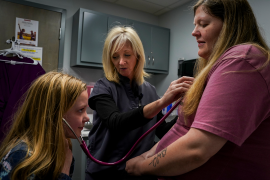In 2018, the Trump administration announced changes to the “public charge” rule, making it more difficult for immigrants to receive a green card. Under the previous regulations established in 1999, immigrants who received cash benefits, such as Temporary Assistance for Needy Families or Supplemental Security Income from Social Security were deemed a “public charge” and could get their green cards denied by immigration authorities because of insufficient economic resources. The Trump administration changes widened the definition to include people who received Medicaid, certain Medicare subsidies, Supplemental Nutrition Assistance Program benefits, and housing assistance for more than 12 months. Immigration officials also were given discretion to deny green cards to immigrants who were “likely” to receive public benefits in the future.
In February 2021, President Biden signed an executive order announcing reviews to the Trump administration’s changes and then reversed them in March 2021. But even with this reversal, fear and misinformation are likely to persist in immigrant communities and the chilling effects on access to public benefits will likely continue. At least 14 states have filed with the U.S. Supreme Court to defend the widened definition of public charge enacted by the Trump administration. As a result, discussion of public charge continues to remind immigrants that the recent reversal could be overturned.
Impact on Health Coverage and Public Health
The impact of the Trump administration changes to the public charge rule fell heavily on low-income immigrants who qualify for these public programs. While the assistance was much needed — especially in 2020 during the COVID-19 pandemic — many of these households chose to disenroll or forgo applying for benefits to avoid jeopardizing their future green card or immigration status. As a result, there was a steep decline in participation in public benefits and programs that allow for economic opportunity and social mobility among immigrant families and uplift children and adults. And while health insurance coverage from the federal and state marketplaces is exempt from public charge regulations, the chilling effect has had a spillover effect on marketplace enrollment.
In California, where one of four residents was born outside the United States, this has serious implications for health coverage. Immigrants in the state are overwhelmingly of Latinx (50%) and Asian (34%) heritage. Research shows that not only have foreign-born members of immigrant families disenrolled from public benefits, but so have U.S.-born children in those families.
New research published by the UCLA Latino Policy and Politics Initiative (LPPI) underscores the vulnerability of non–green card holders and their children in California. LPPI estimates that thousands of Latinx children could lose their usual source of care or forgo care altogether. The number of Latinx children without a usual source of care could increase from just over 64,000 to more than 180,000. The number of Latinx children who avoid visiting a doctor during the year could jump from almost 99,000 to about 224,000 because they have failed to enroll in public health services for which they are eligible.
With COVID-19 disproportionately affecting Latinx people in California, the lack of participation in health care benefit programs has kept immigrant families from accessing the care they need. Fear of and mistrust in the health system among low-income immigrants have further deterred individuals from seeking care even in the presence of COVID-19 symptoms and aggravated existing health disparities. And as the U.S. rolls out COVID-19 vaccination, it is essential that immigrants trust the health system and access this life-saving treatment.
What Comes Next?
The Biden administration’s reversal of recent changes to public charge was a critical first step. More needs to be done, however, to combat mistrust of health care and insurance enrollment. Even before the Trump administration widened the definition of public charge to include recipients of health and nutrition programs, immigrants and their U.S.-born children disenrolled from social-safety-net benefits for fear of becoming ineligible for a green card. Until the public charge determination is completely eliminated, its detrimental effects on immigrant’s access to health care will remain.
Given this continued confusion and mistrust, we need a robust public information campaign deployed by trusted messengers to clarify to vulnerable households what public charge really is and who is subject to the rules. Dispelling disinformation will help immigrant families regain trust in the health system and once again seek out care. This is essential not only for immigrant families but for the health of the United States. We will not fully emerge from COVID-19 without ensuring all communities, particularly those that have been hardest hit by the pandemic, are willing and able to access necessary health services and care.





